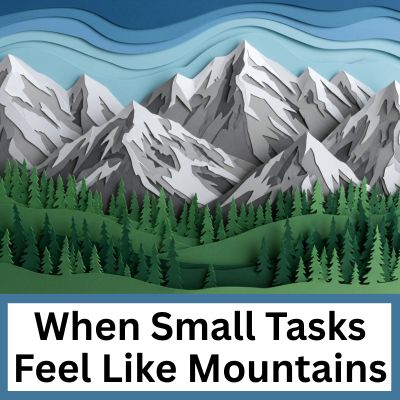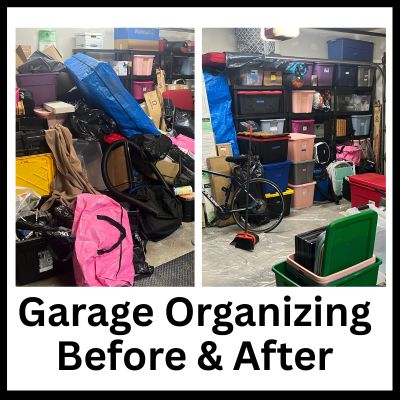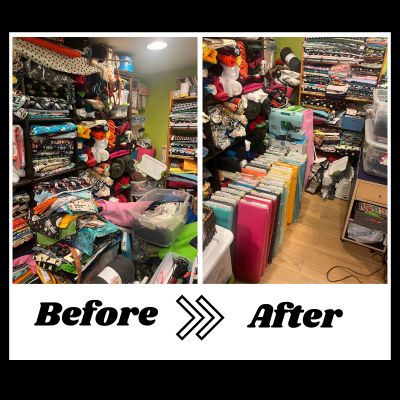Would You Rather Iron Socks?

I was recently teaching an organizing class about how to prioritize tasks. As we were talking about all the things that get in the way (time, skills, other responsibilities, etc), one of the ladies raised her hand and said “do you mean EXCUSES??”. We all laughed. She said comes up with all kinds of important tasks, like ironing socks, to avoid dealing with the tougher stuff. She had a great sense of humor about it, especially considering that her husband died less than five years ago, so she’s got a lot to deal with. We all can make up really good excuses not to do the things we want to do, and avoidance often disguises itself as productivity. Things like mindless phone scrolling, binge watching TV, or video games are all obvious procrastination outlets, but how do you know when you’re using productive excuses to mask deeper avoidance? In this post, I’ll talk about how to balance “being productive” with getting the truly important stuff done.
Here are some examples:
- Socially acceptable forms of procrastination to evade personal responsibility: You love helping others! Despite seriously needing to tend to your own clutter, you spend long hours on the phone with a friend to help them sort out their problems, or you’ll even go over to someone else’s house to help them with their house chores, only to go home to a hot mess of your own.
- Respectable distractions to avoid what really matters: Work emergencies are non-stop, and you are the person who always rises to the occasion. You get praised by your customers, co-workers, and boss, meanwhile, your bedroom and home office are a disaster zone.
- High-functioning avoidance in disguise: You hyperfocus on meticulously tending to your garden, but you’re embarrassed to let anyone into your home because the clutter has seeded like dandelions after a windstorm. Just like a morning-glory in a flower bed, it’s deceptively pretty at first, now impossible to manage. (If anyone has ever had morning-glory growing INTO their house, you know exactly what I mean!)
- Task-based avoidance instead of real progress: You know how to do laundry SO WELL (almost TOO PERFECTLY) that it becomes overly time consuming, and never actually gets done. These are likely the people who iron their sheets (or socks!), who swear they will mend holes that have been waiting to get mended since Obama was in office, or who obsessively air-dry stuff that can really just go in the dryer. (Yes- air-drying is usually much better for clothes long term, but put this into the perspective of mounds of laundry that needs to get processed).
- Virtuous procrastination fills your to-do list: Volunteer responsibilities and board commitments occupy so much of your time that you’re never home long enough to process several years of paperwork that needs to be gone through.
- Endurance-level escapism masked as “goal setting”: You decide you’re going to run a marathon (yet you’ve barely ever ran more than two miles before). You buy the best gear and never miss a training, meanwhile, your kitchen counter looks like it’s been in a war zone of unopened mail, dirty dishes, and groceries that still need to get put away.
Recognizing Your Avoidance
All of the things I listed (helping others, doing a good job at work, growing a beautiful garden, being an expert laundress, volunteering in the community, and exercising) are all wonderfully commendable activities to engage in. The problem is when the balance of doing these activities heavily outweighs the activities you’re avoiding. Sometimes it’s an easy fix, such as hiring a housecleaner, scheduling time with a professional organizer, or just noticing that you’ve got a mess on your hands and making some time to deal with it. You may not actually realize you are substituting productivity to avoid bigger problems. But once you recognize the pattern, you can start to shift it. Small, intentional changes can create momentum. With the right support, even the most overwhelming tasks become manageable.
What to do about it
Avoidance is not laziness. It’s usually overwhelm, fear, or grief. Start by giving yourself compassion. Instead of criticizing your behavior, get curious about it. What are you protecting yourself from? What feels too big, too sad, or too messy to face? Put on your own oxygen mask first, without isolating yourself. You don’t have to do it all alone. Sometimes this means asking for help, hiring support, or letting a friend know you’re struggling to get started. But even if you’re not totally ready to “let anyone in”, make sure to get out of the house at least once a day, and try your best to socialize with others. Even if it’s just smiling at a neighbor. Connecting with others is the best antidote to decluttering and getting organized. If you’re dealing with really heavy stuff, please consider making an appointment with a therapist or other trusted mental health professional who can help you process your emotions in a safe environment.
Many people have trouble getting started, and my go-to advice is to start with the EASIEST thing first. Look for a quick win- something that doesn’t require a big emotional lift. Sorting and discarding are going to help you feel like you’ve accomplished something, and trigger a boost of endorphins to give you the momentum to keep going. Set a timer, and spend 10 minutes on a small section, ideally looking for things to purge. Each item released is one less thing weighing on your space and your mind! As you build confidence, increase your time so that you can tackle slightly bigger sections. Remember to focus on progress over perfection!

Posted By Jean Prominski, Certified Professional Organizer
- Follow me on Instagram @seattlesparkle
- Join my Facebook Group, Declutter and Organize with Seattle Sparkle.
- Ready to book a consultation? Complete this form.




